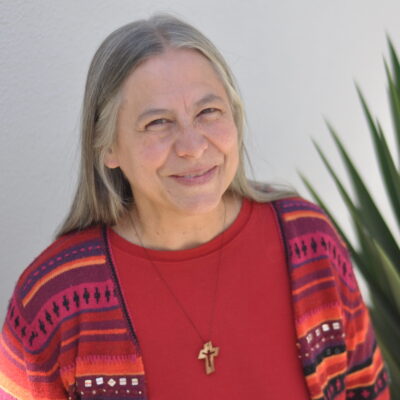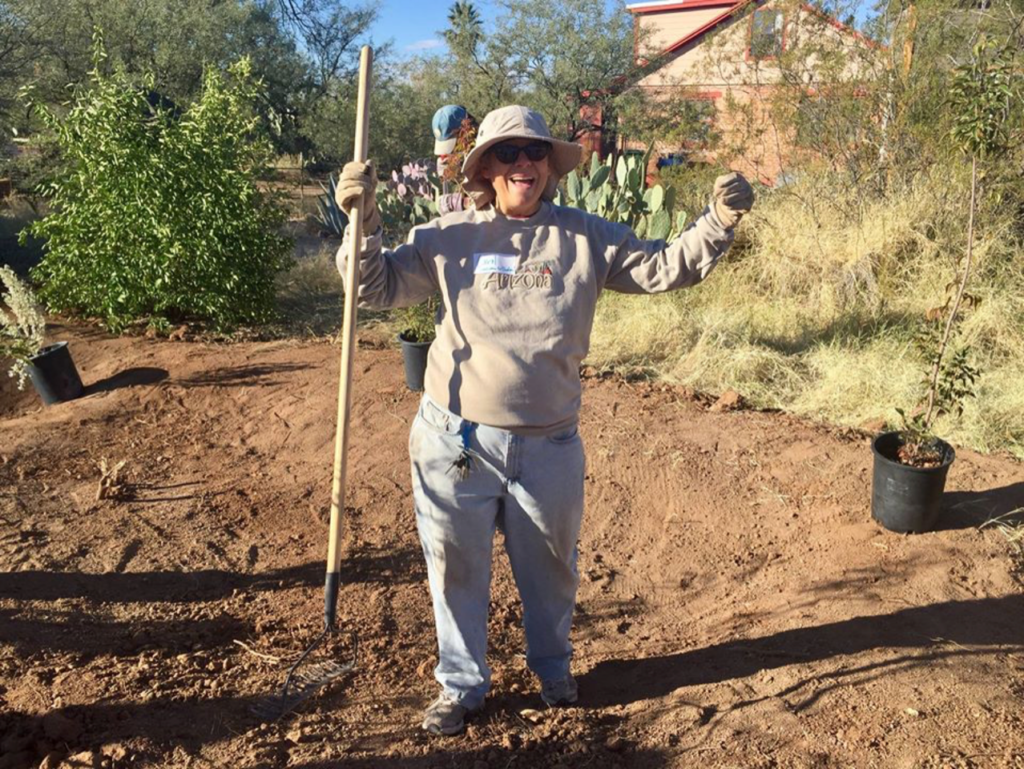Mennonite Creation Care Network (MCCN) has selected Carol Rose, co-pastor of Shalom Mennonite Fellowship, Tucson, Ariz., as the recipient of its 2022 Art and Jocele Meyer Award. The award recognizes both care for creation at the congregational level and the liaison’s role in communicating with the broader network. It also includes a $500 donation toward the congregation’s environmental ministry.
Since she began at Shalom seven years ago, Carol has consistently encouraged the congregation’s environmental concerns and helped develop them further. In 2018, the church installed its first solar panels with the help of a Pam De Young Net Zero Energy grant from MCCN. The church has since undertaken a second solar project in order to cover the needs of multiple buildings on their property. A nanogrid links the electrical systems in order to take advantage of complementary energy needs that peak at different times.
Embracing desert ecosystems
Carol is also an enthusiastic advocate for desert ecosystems and the possibilities inherent in a church’s backyard. With what her co-pastor, Tina Schlabach, describes as “great passion and enthusiasm,” Carol has organized many community work days to install native landscaping on the church’s 1.6 acre lot. Many people participated in preparing the ground, planting, and watering over the first months and years in order to help create a beautiful space and capture rainwater. Carol takes pride in the recent addition of an ironwood tree–a spiny desert species that is threatened in their region. She looks forward to seeing it explode in a cloud of tiny pink blossoms in due season.
Since COVID, Shalom Mennonite has had many opportunities to enjoy their setting. They have been worshipping outside all fall and winter, sitting under a shade cloth with the Catalina Mountains in the distance and butterflies meandering through. The setting lends itself to worship series that weave together creation care and biblical teaching.
“I particularly love preaching sermons that draw from both scripture and the desert ecosystem,” Carol says. “I did one shaped by sahuaro cacti and another entitled “the Monsoon of God’s love.”
Standing with Indigenous Groups
Carol’s leadership has also undergirded the church’s support for the San Carlos Apache people who are struggling to stop the theft of Oak Flat–an area sacred to their tribe. The U.S. government has promised this beautiful oasis in the desert to the Resolution Copper Mining Company. Carol’s advocacy has enabled her to build relationships with many of the indigenous people who oppose the mine and its environmental consequences. On February 10–thanks to an invitation from the Apache Stronghold–Carol had the honor of speaking at Oak Flat during a meeting about consultation between the San Carlos Apache and the U.S. government. She described why she believes native spirituality should be respected and how it relates to water protection and climate change.
“Whenever I connect with Carol, it seems she is always coming from or going to Oak Flat. I am inspired by the joy she radiates when talking about this place and the way that her activism makes time for authentic relationships with the land and with people,” says Jennifer Schrock, director of MCCN.
More locally, Shalom Mennonite Fellowship has donated to efforts led by the Tohono O’odham. These include a youth collective and two groups struggling against the border wall which slices across the Tohono O’odham Nation, blocking streams and migration patterns. Recently, the congregation reaffirmed its commitment to Indigenous Peoples by officially joining Dismantling the Doctrine of Discovery’s Repair Congregations Network.
“Carol’s pastoral leadership in all of these projects has helped our congregation make much-needed connections between their biblical faith and creation care justice work needed so badly in our beautiful world,” Schlabach says. Thanks to Carol’s attention to sharing information and photos, Mennonite Creation Care Network has benefited as well.
Carol would enjoy using MCCN’s $500 award to invest in signage for the native plants on the property. Ceramic tiles would be nice, she says. In a sunny climate where even street signs peel and fade in a few years, budget signage doesn’t work well.
MCCN’s award is named for Art and Jocele Meyer, who were pioneers in the areas of environmental justice and land restoration before many people recognized the importance of these issues. They are the authors of Earthkeepers: Environmental Perspectives on Hunger, Poverty and Injustice (Herald Press, 1991).
Photo caption: Carol Rose, co-pastor of Shalom Mennonite Fellowship, during a planting day on the church grounds.

